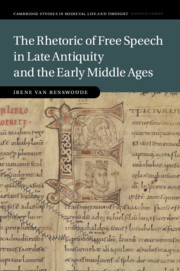Book contents
- The Rhetoric of Free Speech in Late Antiquity and the Early Middle Ages
- Cambridge Studies in Medieval Life and Thought Fourth Series
- The Rhetoric of Free Speech in Late Antiquity and the Early Middle Ages
- Copyright page
- Dedication
- Contents
- Acknowledgements
- Abbreviations
- Introduction
- Part I
- 1 The Steadfast Martyr
- 2 Hilary of Poitiers
- 3 The Detached Philosopher
- 4 Ambrose of Milan
- 5 The Silent Ascetic
- Epilogue Part I
- Part II
- Bibliography
- Index
Epilogue Part I
from Part I
Published online by Cambridge University Press: 23 September 2019
- The Rhetoric of Free Speech in Late Antiquity and the Early Middle Ages
- Cambridge Studies in Medieval Life and Thought Fourth Series
- The Rhetoric of Free Speech in Late Antiquity and the Early Middle Ages
- Copyright page
- Dedication
- Contents
- Acknowledgements
- Abbreviations
- Introduction
- Part I
- 1 The Steadfast Martyr
- 2 Hilary of Poitiers
- 3 The Detached Philosopher
- 4 Ambrose of Milan
- 5 The Silent Ascetic
- Epilogue Part I
- Part II
- Bibliography
- Index
Summary
The first part of this book has focussed on the complex process of adaptation and reinterpretation of the classical tradition of free speech between the third and seventh century AD. As I hope to have demonstrated, Christian interpretations of parrhesia were diverse, and not all of these interpretations were exclusively spiritual. In Christian conceptualisation(s), parrhesia kept many of the moral and political aspects that had been part of its pre-Christian tradition. In analogy with Roman citizens drawing their licence to speak from their free status within the Roman Empire, Christians laid a claim to freedom of speech because they regarded themselves as free citizens in the kingdom of Christ. Christians conceived of their parrhesia as a tool to spread the gospel, to state their Christian identity, to combat heresy or to imagine the relationship between man and God.
- Type
- Chapter
- Information
- Publisher: Cambridge University PressPrint publication year: 2019

